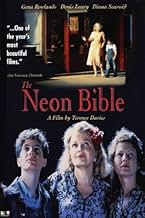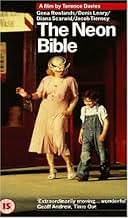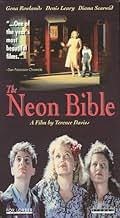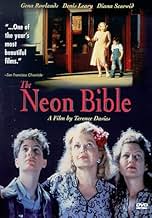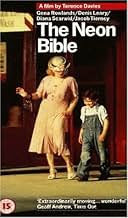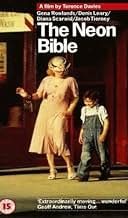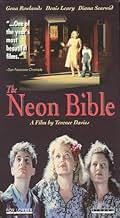Agrega una trama en tu idiomaWhile on a train, a teenage boy thinks about his life and the flamboyant aunt whose friendship acted as an emotional shield from his troubled family. This film evokes the haunting quality of... Leer todoWhile on a train, a teenage boy thinks about his life and the flamboyant aunt whose friendship acted as an emotional shield from his troubled family. This film evokes the haunting quality of memory while creating a heartfelt portrait of a boy's life in a rural 1940s Southern town... Leer todoWhile on a train, a teenage boy thinks about his life and the flamboyant aunt whose friendship acted as an emotional shield from his troubled family. This film evokes the haunting quality of memory while creating a heartfelt portrait of a boy's life in a rural 1940s Southern town.
- Dirección
- Guionistas
- Elenco
- Premios
- 1 premio ganado y 2 nominaciones en total
- Dirección
- Guionistas
- Todo el elenco y el equipo
- Producción, taquilla y más en IMDbPro
Opiniones destacadas
So, I was naturally quite excited when I stumbled upon the DVD release of this movie; I wasn't even aware that any of Toole's work had been adapted to film. But I was also a little wary. Movies have a tendency to trivialize great books, and I predicted that "The Neon Bible" might, in cinematic form, degenerate into a depressing slog.
Alas, my prediction proved true. This movie is a slog. Director Terence Davies paces it like a funeral procession. He also fills the movie with weird, protracted shots of blackness, of whiteness, of starry skies; I imagine he's trying to be deep somehow, but all his slow zooms just bore me. Besides, at times he overplays the starry sky thing so much that it looks like the protagonists live in a cabin in outer space.
Both the book and the movie are anecdotal, but the book works because David - the shy teenage "hero" - makes an interesting narrator. His voice binds the anecdotes together, and naturally the reader learns about him through the narration. In this movie, though, he's largely silent; he just lurks around in the background of his own story. And, without his narration, the anecdotal scenes often make little sense and have no apparent connection.
I feel guilty about badmouthing this film, to an extent, because it at least strives for faithfulness. But the deadly slow pace really undermines everything. For instance, there's a Christian rally at one point, headed by an evangelist called Bobby Lee Taylor. In the book, this is a rousing set-piece, and Taylor is depicted as an energetic young man who really seems to believe the (ahem) propaganda he spouts. But, in the movie, Taylor is depicted as a lifeless old man, and he basically announces to the audience in an aside that he's a shyster. Ho-hum. That's the Hollywood trivializing machine at work. And the scene as a whole completely lacks energy, verve, oomph - whatever you want to call it.
This is going to sound like a strange statement, but I'm starting to develop a love-hate relationship with movies, with the emphasis on hate. It's always easy and tempting to pop a DVD in my player and relax for the evening, but I find lately that I get a lot more out of indulging in the brain-stimulating alternative pastime of reading. After all, books are, on the whole, lots better than movies. Case in point..."The Neon Bible."
I still can't stop hoping that, one day, they'll make a movie version of "Confederacy of Dunces." But I bet that'll be inferior to the book, too.
It is dreamy, corny, beautifully set-staged, almost, but its subject matter isn't. It traipses along as if in a trance, we are either taken in by its beauty or it just passes by, languidly, slowly, and yes, boringly.
I can't remember if anyone swore. There was blood, otherwise what happened? People sang quite a lot, embarrassingly, at times, otherwise one contrived scene floated into the next. True, I've not read the book, so cannot compare.
I think it could work if perhaps if it was written by Harold Pinter and directed like a Dennis Potter - jet black, violent and maybe then, memorable.
As it is, it's soppy, attempting to be different, where being different is like being different in the school playground; it looks odd, that oddness showing up over any potential good and thus making the film simply not work.
The resulting film is disjointed, episodic and because of how internalized David is the plotting is hard to fully grasp. I am not sure if the plot is understandable if you *haven't* read the book. The material is about the oppressive nature of small town life for different people-especially fire and brimstone religion-builds up anger and resentment that comes out in violence. That comes across in the film if you know you are looking for it. If you not I think much of the film will be esoteric.
I ultimately ended up liking the film on the level of the companion to the novel. It helps a lot that I rather like the book and there's not much different in the works. The cinematic qualities are fairly good-if a little TV production. The melancholy of the novel comes through loud and clear.
Overall I am glad this film exists but it could have been better.
Edward Guthmann said the film was poorly received when it premiered at Cannes, but called it "gorgeous" and "one of the year's most beautiful films." He said it was a rewarding film that requires a little faith from the viewer due to long, slow, "lingering shots that work as a kind of meditation." He described the revival meeting at night "like an Edward Hopper or Thomas Hart Benton painting come to life." I will grant the film that it looks beautiful, but it lacks a deeper substance which would be necessary to make this a great film.
Director Terence Davies said "The Neon Bible doesn't work, and that's entirely my fault. The only thing I can say is that it's a transition work. And I couldn't have done The House of Mirth without it." I appreciate that he is humble enough to admit this is not his best work. Again, the film looks brilliant, so it's far from a complete failure. And you have to respect the brave casting decision that brought Denis Leary, not known for his subtle acting, on board.
Davies is also, in my opinion, one of the few directors who accurately depicts the act of remembering. Without giving anything away, it's always important to keep in mind that David is on a train, thinking and remembering. No one remembers something from the past totally, memory functions like fragments and it's up to us to flesh them out. Sometimes we think of something one way, later another away; forget, remember or distort. David is fleshing out the events of his life and that's th most important thing about the film. Sometimes we remember minute, isolated events... Davies puts those in the film as well. Just sit back and enjoy the pace of this remarkable film from an equally remarkable and brilliant director.
A sheet blowing - music from Gone With the Wind - he turns into high drama; Stephen Foster's 'Hard Times' as David begins to hit bottom. It IS a musical - Davies has always used music for forward his narrative and uses it in this film in a more sophisticated way than in his earlier films to even more startling effect.
Everyone turns in remarkable performances - the entire cast and the photography is beyond amazing. Davies is the master of the tracking shot.
Please, be patient with the pace of the film - sit back and enjoy the ride. Get used to the rhythms and then give all of yourself to the film, jump in. It's beautiful, melancholy and sad. Davies' films are always so full of life and this is no exception. No idea why this film gets a bad rap - hands down, one of the greatest films of the 1990s. It's totally unique - it comes from nowhere. Shots, colors, textures - all perfect. Everything. Enjoy the ride.
¿Sabías que…?
- TriviaIn an interview with "Time Out Film", Terence Davies said about this film, "[It] doesn't work, and that's entirely my fault. The only thing I can say is that it's a transition work. And I couldn't have done La casa de la alegría (2000) without it."
- Citas
David, aged 15: If you were different from anybody else in town, you had to get out. They used to say in school, "you have to think for yourself," but you couldn't do that in town. You have to think what your father thought and that was what everybody thought.
- ConexionesFeatured in Fandor: Cannes You Dig It? | Fandor Spotlight (2022)
- Bandas sonorasOh Lord, How Long?
Traditional
Selecciones populares
- How long is The Neon Bible?Con tecnología de Alexa
Detalles
Taquilla
- Total en EE. UU. y Canadá
- USD 78,072
- Fin de semana de estreno en EE. UU. y Canadá
- USD 5,045
- 3 mar 1996
- Total a nivel mundial
- USD 78,072
- Tiempo de ejecución1 hora 31 minutos
- Color
- Mezcla de sonido
- Relación de aspecto
- 2.35 : 1
Contribuir a esta página


